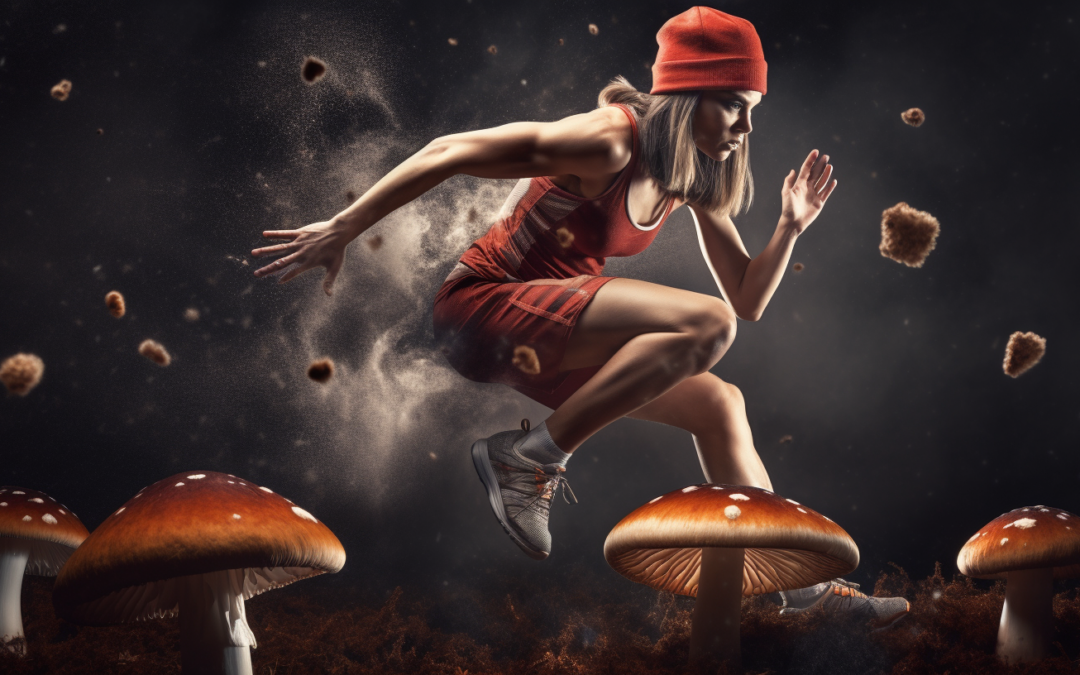As the boundaries of athletic performance continue to be pushed, a new and unexpected player has entered the field: psilocybin, the active compound found in “magic mushrooms”. This compound, when consumed in small amounts, a practice known as “microdosing”, has been reported to enhance cognitive flexibility, concentration, and endurance, among other effects. I
The Athletic Potential of Psilocybin Mushrooms
Mycologists have been studying fungi for centuries, but one genus, in particular, has been attracting significant attention recently: Psilocybe, more commonly known as psilocybin mushrooms or ‘magic mushrooms.’ As fitness trainers and athletes worldwide continuously search for that competitive edge, psilocybin mushrooms have entered the conversation, not for their psychedelic properties but for their potential benefits to athletic performance.
Psilocybin mushrooms come in over 200 different types, each with its unique properties. Some of the more well-known varieties include Psilocybe cubensis, Psilocybe semilanceata, and Psilocybe azurescens. These mushrooms are renowned for their hallucinogenic properties due to the presence of the chemical compound psilocybin, which converts into psilocin in the human body, inducing a psychedelic state. However, what is lesser-known are the potential health benefits these mushrooms can offer, particularly in relation to athletic performance.
Psilocybin mushrooms are rich in several nutrients, including antioxidants, which fight free radicals and reduce inflammation in the body. They also contain vitamins such as Vitamin D and B-vitamins, particularly vitamin B6, which plays a crucial role in neurotransmitter regulation. Furthermore, they contain minerals such as potassium and copper, which are essential for maintaining optimal body function.
The connection between psilocybin mushrooms and athletic performance may not be obvious at first glance, but there are several ways these fungi could potentially aid athletes. One such way is through the reduction of anxiety and depression. Preliminary research has shown that psilocybin can help with these mental health issues, which could subsequently lead to better performance for athletes who suffer from them.
Moreover, the presence of antioxidants could have a direct impact on muscle recovery. Intense physical activity generates oxidative stress, which can lead to inflammation and muscle damage. By reducing this oxidative stress, athletes might recover faster from their workouts.
Current research studies on this topic are ongoing, and while I would need to use the browser tool to get up-to-date results, as of my last training data in September 2021, psilocybin was starting to be recognized for its potential benefits outside of its psychedelic properties. As more and more studies are conducted, it will be interesting to see how the role of psilocybin mushrooms in athletic performance evolves.
Recent studies have suggested that microdosing psilocybin mushrooms could potentially act as cognitive enhancers. Microdosing involves taking psilocybin at doses lower than the threshold for a fully immersive psychedelic experience, which has been observed to promote cognitive flexibility and increase divergent and convergent thinking. This boost in cognitive flexibility could potentially give athletes a competitive edge in sports1.
Examples of Sports Where Athletic Performance Can be Enhanced
- Long-Distance Running: The sport of long-distance running is as much a test of mental endurance as it is physical. Runners often speak of hitting ‘the wall’, a moment where mental fatigue sets in and continuing seems almost impossible. Microdosing psilocybin mushrooms may enhance cognitive flexibility and concentration, potentially helping runners maintain focus and determination during these grueling races. The increased cognitive flexibility could also help runners better adapt to changing conditions on the course, such as variable weather or terrain. Additionally, anecdotal reports suggest that microdosing may improve stamina and the ability to overcome fatigue, which could be particularly beneficial during long runs.
- Martial Arts: Martial arts like Brazilian Jiu-Jitsu (BJJ) require a high level of cognitive flexibility and concentration, as practitioners must constantly adapt to their opponent’s movements and strategies. BJJ is often likened to a game of chess, due to the cerebral nature of the sport. Some BJJ practitioners report similar improvements in cognitive flexibility when using psychedelics before competing, which helps them get into the “flow zone”, where their moves are seamless and continuous. The potential for psilocybin mushrooms to enhance cognitive flexibility and focus could therefore be a significant advantage in such a mentally demanding sport.
- Winter Sports: Sports like snowboarding and skiing require not just physical skill but also a high degree of mental acuity, balance, and coordination. Athletes must react quickly to changing conditions on the slopes, and maintain focus and concentration despite the physical demands of the sport. Athlete and author James Oroc discusses the prevalence of psychedelics usage at “psycholytic” doses among winter sports athletes, noting improvements in balance, reflexes, and concentration, along with the ability to overcome fatigue and altitude sickness. They liken the experience to being in a “flow-state” or being “in the zone” where time appears to slow down and they become capable of “instantaneous feats of non-thinking coordination1.” In such high-speed, high-risk sports, the ability to enter this “flow state” and react instantaneously could potentially make a significant difference in performance.
An article written for the Multidisciplinary Association for Psychedelics Studies (MAPS) discusses the prevalence of psychedelics usage at “psycholytic” doses among winter sports athletes. These athletes report improvements in balance, reflexes, and concentration, along with the ability to overcome fatigue and altitude sickness. They liken the experience to being in a “flow-state” or being “in the zone,” where time appears to slow down, and they become capable of “instantaneous feats of non-thinking coordination”1.
In sports like Brazilian Jiu-Jitsu, practitioners report similar improvements in cognitive flexibility when using psychotropic substances before competing, likening it to a state of flow where movements are seamless1.
Interestingly, as of now, psychedelics do not appear on the World Anti-Doping Agency’s (WADA) list of banned substances. This absence likely has to do with the lack of robust, scientific studies into their effects as performance-enhancing drugs (PEDs). However, if the performance-enhancing effects of psychedelics reported by athletes are eventually confirmed by scientific studies, they may be viewed by doping agencies in the same light as cannabinoids, which are currently prohibited due to their potential as PEDs1.
Currently, WADA may grant a Therapeutic Use Exemption (TUE) to athletes using medical marijuana while competing. In the future, athletes could potentially apply for a TUE while using psychedelics, should scientists elucidate the therapeutic benefits of these drugs1.
It’s important to note that much of the evidence provided in this field is anecdotal, and there is a lack of peer-reviewed, robust scientific literature on the topic of psychedelics as PEDs. However, the preliminary studies and anecdotal reports serve as a starting point for a more rigorous investigation into the subject matter. In the coming decades, we might see a new breed of athlete, one who possesses a cognitive edge over their competition, thanks to the mechanisms of action of psychedelics PEDs1.
Conclusion
In conclusion, psilocybin mushrooms hold a lot of untapped potential in the realm of athletic performance. They offer a range of nutrients beneficial to overall health, can potentially enhance cognitive flexibility, and may aid in recovery and stress reduction. As research continues in this exciting field, the athletic world will watch with anticipation to see how these ‘magic mushrooms’ might redefine the boundaries of performance.

